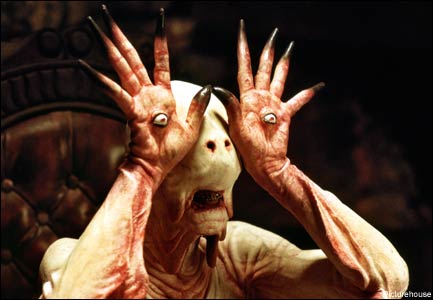« Miss Potter (2006) – Movie Review | Home | The Last Sin Eater (2007) – Movie Review »
Pan’s Labyrinth (2006) – Movie Review
By Robert L. Jones | January 19, 2007

“I’m NOT ready for my close-up, Mr. DeMille!”: Doug Jones as Goatboy in Guillermo del Toro’s “Pan’s Labyrinth”
Pretención
[xrr rating=3/5]
Pan’s Labyrinth (El Laberinto del Fauno). Starring Ariadna Gil, Ivana Baquero, Sergi López, Maribel Verdú, Doug Jones, Álex Angulo, Manolo Solo, César Vea, and Roger Casamajor. Music by Javier Navarrete. Cinematography by Guillermo Navarro. Edited by Bernat Vilaplana. Written and directed by Guillermo del Toro. (Picturehouse/Warner Sogefilms, 2006, Color, 114 minutes, in Spanish with subtitles. MPAA Rating: R.)
One consequence of Hollywood’s descent into the morass of mindless formula-driven folderol was the rise of independent filmmakers. They’ve stepped in to fill the void left by unimaginative producers who cynically market the same tired sequels, remakes, and thinly veiled plagiarisms of last year’s blockbusters.
Pan’s Labyrinth, billed as a “fairy tale for adults,” has almost everything I love in moviemaking: great performances; riveting action; superior production values, including scrupulously researched costumes and sets; tight, precise editing; gorgeous cinematography with rich, warm colors that embrace the eye; and a self-assured director who seamlessly melds special-effects sequences with the drama, without jarring the viewer’s visual sensibilities. Universally praised by critics, Pan’s Labyrinth recently won three Oscars, including best cinematography, art direction, and makeup.
Yet, something’s missing, and it ain’t Bunny Lake.
What were the best bedtime stories you remember? Dollars-to-doughnuts, they were the ones in which mom and dad kept you in suspense, doling out the fable in miserly doses. “And then what happened, Daddy?” you’d ask over and over as you sat up in bed, gripping the blankets in breathless anticipation of news about the hero’s fate.
Like a bedtime story, Pan’s Labyrinth opens with narration. It’s a device useful in prefacing or encapsulating a fantasy story’s basic premise, but it’s best used briefly—just enough to orient the audience and hint at what lies ahead.
Yet, from frame one, the narrator tells us that once upon a time there was a princess who lived in an underground paradise, where there was no pain or fear. But, dreaming of what life must be like above on Earth (much like the mythical heroine Undine), she escaped to live among the mortals and died as a mortal.
Fine—a great set-up. But then the narrator cannot shut up: “However, her father, the King, always knew that the Princess’s soul would return, perhaps in another body, in another place, at another time. And he would wait for her….”
Cut to a Rolls-Royce limo driving along a road through the forest, where we meet the story’s heroine—a beautiful young girl, Ofelia (played by Ivana Baquero), accompanying her pregnant mother, Carmen (Ariadna Gil). We immediately learn that the bloody Spanish Civil War is nearing its end, and that Ofelia likes to lose herself in fairy-tale books. Then, while the car is stopped in the woods, she discovers a large grasshopper—actually a fairy in disguise.
Thus, about five minutes in—given information that’s telegraphed as clumsily as a Rex Grossman pass—we already know that (a) Ofelia is the ancient princess incarnate, and that (b) the mother-daughter story is merely a vehicle to transport her back to her underground kingdom.
So, at the outset, Pan’s Labyrinth breaks the first rule of storytelling: Do not give away the ending. That’s why it’s called “the end.” As Eli Wallach said in The Good, the Bad, and the Ugly: “When you have to shoot, shoot. Don’t talk.” Not just good advice for gunslingers, but for filmmakers as well.
Forced to accompany Ofelia along on her predestined journey, I tell myself: “Perhaps you’re being too harsh. After all, our heroine is a sweet, precocious girl with a vast imagination. Maybe the narration was a red herring, meant to throw us off the trail.” So we continue.
We next learn that Carmen has brought Ofelia to live with her new stepfather, Captain Vidal (Sergi López), in a castle that’s been converted into a company headquarters for part of Generalissimo Franco’s cavalry. Vidal, who commands the outpost, is a brusque martinet with a sadistic streak. He disdains Ofelia and regards Carmen as little more than a vessel to bear him a son to carry on the family name. Outside the castle, the forest is thick with Republican rebels whose gunfire pesters the soldiers and frightens Ofelia and her bedridden mother.
“Wow, what a horribly unsuitable life Ofelia has been forced into,” I think. But, sure enough, one night the grasshopper/fairy shows up to lure Ofelia to its lair, the underground labyrinth that’s conveniently located on HQ property. There, Ofelia meets Pan (Doug Jones), a cloven-hoofed man-goat. Pan informs Ofelia that she’s been chosen to perform three deeds that will require all her daring, cunning, and sober judgment.
“Great!” I’m thinking. “This story’s salvageable after all! Now, the rest of it will involve Ofelia’s adventure through the dank underground maze.”
But that’s not what happens. Ofelia is sent back up to face the dreariness of life in the castle and the horror of warfare.
Yes, Ofelia is resourceful, compassionate, and brave. But, there’s no mystery or suspense. Whether she’s stealing a golden key from a giant evil toad, nursing her frail mother to health with the aid of a magical root put under her bed, or re-entering the labyrinth to filch another treasure, the narrator’s conceit has reduced Ofelia from a heroine to an automaton performing predictably heroic acts. What rightfully should have been a suspenseful tale of a little girl’s emerging heroism instead becomes a tedious exercise in connecting easily anticipated plot dots.
The movie ditches the fantasy quicker than you can say “Abraham Lincoln Brigade,” and the Spanish Civil War plot comes to dominate. Captain Vidal is one bad hombre, leading a posse of officers so rigidly fascistic they even open their umbrellas in heel-clicking unison. When they capture some saintly peasant partisanos, Vidal takes special glee in offing them, point-blank, with head shots from his Luger. For me, Vidal came off as an unintentional parody of Al Pacino’s coke-addled gangster Tony Montana in Scarface: He sneers viciously and punctuates his dialogue with the f-word as much as an R-rated movie will allow, which is all the time. I kept waiting for him to break out at any moment with, “You wanna f*ck with me? Okay. Say hello to my little friend!”
At this point, I’m thinking, “What fairy tale? What labyrinth?” I suddenly find myself fantasizing about director del Toro and his producers meeting during pre-production:
“Okay,” del Toro says, “so we’ve got about a half-hour of this medieval underground fantasy stuff that we can beef up to two hours with lots of mind-blowing CGI special effects and surround sound.”
The fat money-guy sucking his stogy and blowing smoke in everyone’s face ain’t convinced, though. “It’s been done. Last year. Lord of the Rings. Got anything else?”
“Okay, so how about we take the Lord of the Rings story and then bring in For Whom the Bell Tolls—you know, to fill it out?”
“Genius!” the money guy exclaims. “Run with it!”
So, in the tension-laden penultimate scene—after Pan has given Ofelia a chance to redeem herself by bringing him her newborn baby brother—she, in an act of defiance, refuses to sacrifice the kid to his clutches. Very noble. Then, Ofelia is subsequently—and perfectly predictably—dispatched by Vidal’s pistol. No, I haven’t given away the ending: you could see it coming an hour ahead of time.
What ought to have been a heart-rending, cathartic moment becomes instead an afterthought. (“Gee, I was wondering when the heartless Captain Vidal would shoot Ofelia, so that she could pass her final test and resume her rightful reign as princess of the Labyrinth Realm…”)
As the credits rolled, I sat there fuming to myself. You mean I sat through this thing just to be served the shopworn moral that “this Earthly life is but a vale of tears”? I thought I was spending my $7.50 to escape that sort of thing for two hours.
Feeling like the victim of a manipulative emotional mugging, I bolted from my seat. While in the lobby afterward, I overheard a gringo couple exclaiming what a masterpiece Pan’s Labyrinth was. Mostly, they discussed the ethereal lighting, the upbeat soundtrack, the great special effects—everything except the story. But, they can be excused, because middle-class gringos are easily lulled into thinking that watching movies with subtitles makes them erudite and culturally sophisticated.
I was more inclined to agree with the Mexican guy whom I heard giving his pal his own assessment: “I knew it’d end that way.”
“Yeah,” his friend rejoined, “me too. The f*cking narrator said it would.”
Sadly, the film industry has come full-circle. In the decade or so since the trickle of independent films has grown to a torrent, the young Turks operating outside of the system have proven that they too can create works just as slick, hackneyed, and shallow as their Hollywood counterparts. The term “independent” once described wunderkind upstarts like Orson Welles and John Cassavetes or geniuses like Alfred Hitchcock and Otto Preminger who earned the clout to strike out on their own. Now, it’s become a euphemism for “dependent on the good graces of Robert Redford and film festival juries.” I offer Pan’s Labyrinth as Exhibit A that the “independent revolution” is over.
However, if you want to see a truly spellbinding fantasy flick that twists and turns and offers up a universally uplifting message at its end, I recommend Labyrinth, the 1986 movie starring David Bowie and Jennifer Connelly. It speaks volumes about the current state of independent film that the Muppets’ late creator, Jim Henson, could have delivered a yarn more gripping and suspenseful than this offering from the indies’ latest fair-haired boy.
Robert L. Jones is a photojournalist living and working in Minnesota. His work has appeared in Black & White Magazine, Entrepreneur, Hoy! New York, the New York Post, RCA Victor (Japan), Scene in San Antonio, Spirit Magazine (Canada), Top Producer, and the Trenton Times. Mr. Jones is a past entertainment editor of The New Individualist.
Topics: Costume Dramas, Dramas, Fantasy Movies, Foreign Films, Independent Films, War Movies | Comments Off on Pan’s Labyrinth (2006) – Movie Review
